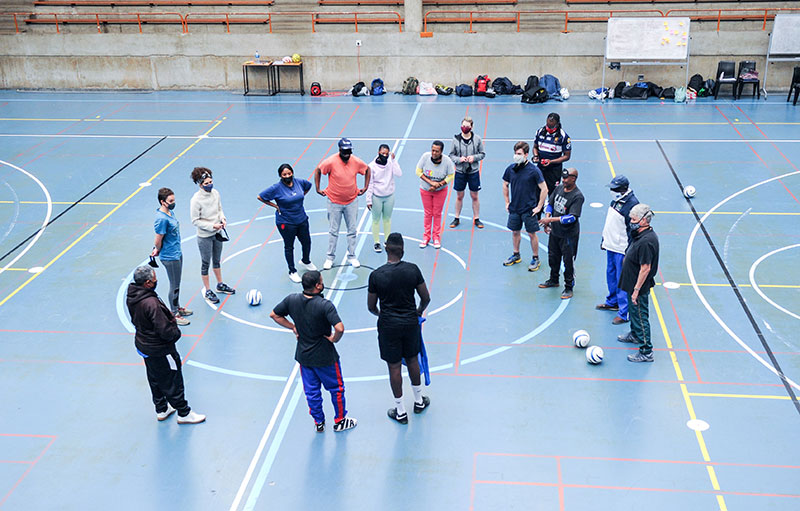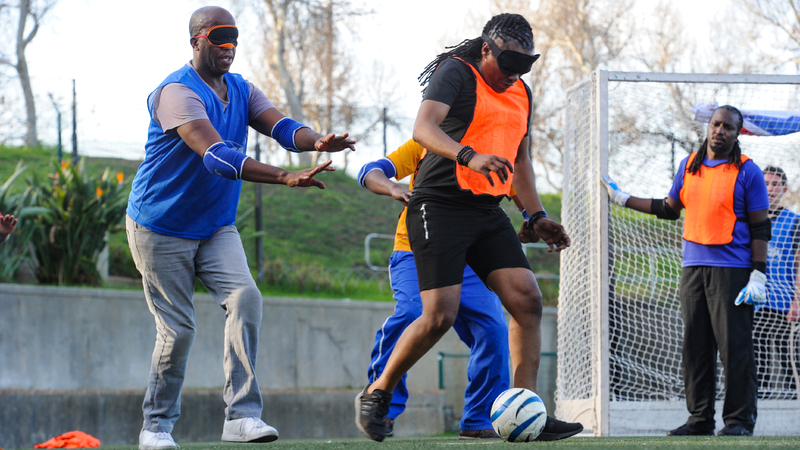UCT Parasport Club hosts inaugural blind football workshop
18 May 2022 | Story Niémah Davids. Photos Lerato Maduna. Read time 6 min.Ask both seasoned and non-professional football players, getting a ball in the back of the net is no mean feat. It requires skill, agility and awareness of what’s going on around you – making it especially difficult for aspiring footballers with visual impairments to participate in the sport they love.
But the University of Cape Town’s (UCT) Parasport Club is determined to change this. In an effort to drive inclusivity in sport, the club hosted its inaugural blind football workshop – a three-day event aimed at both visually impaired and sighted footballers and coaches.
The goal, according to organiser Muya Koloko, is to create a pipeline for blind football in South Africa and to ensure that the game gains prominence and receives the recognition it deserves. And with the right coaching, it’s possible.
“If we [UCT Parasport] can get Cape Town to be the hub of blind football in the country it would be absolutely amazing.”
“This workshop is a small but significant start. If we [UCT Parasport] can get Cape Town to be the hub of blind football in the country it would be absolutely amazing – for aspiring visually impaired football players, coaches and officiants, and for UCT,” he said.
Engaging, fun, informative
Facilitated by internationally recognised blind football coach and coach developer Keon Richardson, the workshop included both a theoretical and practical component, and kicked off at the Sports Centre on Saturday, 14 May.
During sessions Richardson touched on how players with visual impairments should orientate themselves while on the field, how coaches should assist with this orientation, and the role of the goalkeeper – who is often the only sighted player – as both a player and the game director. How best to direct players in and out of ball possession also formed part of the short course. A mix of 25 visually impaired and sighted football buffs participated in the workshop.
“South Africans really love football, and as the Parasport Club we are thrilled to be able to expand the opportunities for people with visual impairments to play football. Having an equal number of participants with and without visual impairments in the workshop presented a fantastic opportunity to get everyone involved in different facets of the game,” Koloko said.
Five-a-side football
After two days of training, participants made their way to UCT’s astro court on lower campus for the practical leg of the workshop, and to allow them to practise what they had learned.

Participants then played a game of five-a-side football. The four on-field players from both teams were blindfolded to ensure that no one was disadvantaged, and players were required to listen carefully for the ball, which contained a rattle on the inside. Players also received strict instructions from their sighted goalkeeper and two match directors on the side of the court.
“The gees [spirit] was something else. There was excitement and engagement all around and everyone had so much fun, even though practical sessions were quite tough and participants were exhausted. This workshop really was the start of something great. We look forward to growing this sport in South Africa,” Koloko said.
A long time coming
The UCT Parasport Club is no stranger to an event of this kind. In 2019 the club hosted a blind football showcase in collaboration with League of Friends of the Blind – a non-governmental organisation that helps visually impaired children, adults and their caregivers to reach their full potential.
In 2020 and 2021 during the height of the COVID-19 pandemic, Richardson also facilitated several webinars on the topic. So, when Richardson pitched the idea of an in-person workshop and agreed to travel to South Africa from the UK to make it happen, the club grabbed the opportunity with both hands.
“This initiative fits in perfectly with what we as a club want to achieve. The concept of sport for all through active participation, coaching, officiating and spectating is important,” he said.
Developing blind football
The workshop is not just a once-off thing. In fact, Koloko said, there are plans to host similar events in the future and to add blind football to UCT’s list of sporting codes. The long-term plan is to work with schools in the Western Cape and elsewhere to develop the sport at both junior and senior levels.
“The aim is to use the knowledge gained during this workshop and to spread it across UCT, the province and the country.”
This work has already started. After a group of participants from the Athlone School for the Blind attended the workshop, they committed to introducing the sport to learners at their school.
“The aim is to use the knowledge gained during this workshop and to spread it across UCT, the province and the country. We really want to be the lifeblood of a blind football Cape Town league and if we can extend enthusiasm for the sport beyond Cape Town that would be great,” Koloko said.
Non-profit organisations involved in the blind football workshop included: League of Friends of the Blind, Cape Town Society for the Blind, Innovation for the Blind, the Gugulethu Goalball Club and the Athlone School for the Blind.
 This work is licensed under a Creative Commons Attribution-NoDerivatives 4.0 International License.
This work is licensed under a Creative Commons Attribution-NoDerivatives 4.0 International License.
Please view the republishing articles page for more information.












